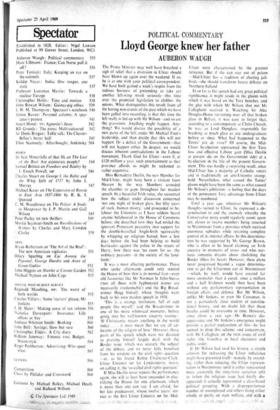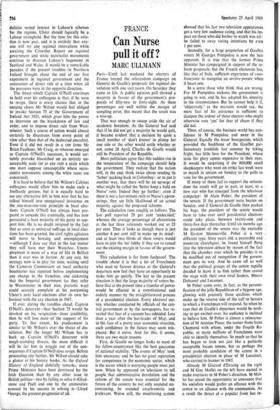Lloyd George knew her father
POLITICAL COMMENTARY AUBERON WAUGII
The Prime Minister may well have breathed a sigh of relief that a diversion in Ulster should have blown up again over the weekend. If so, he is at one with your political correspondent. We have both gained a week's respite from the tedious business of pretending to take yet another left-wing revolt seriously—this time over the promised legislation to clobber the unions. What distinguishes this revolt from all the boring non-events of the past which we have been gulled into recording, is that this time the left really is fed up with Mr Wilson—and so are the grassroots. Anything might happen. Any- thing? We would discuss the possibility of a new party of the left, under Mr Michael Foot's leadership, and then decide that this will not happen. Or a defeat of the Government—that will not happen either. In despair, we would discuss inherent contradictions in the Labour movement. Thank God for Ulster—even if, at £120 million a year, such entertainment as that province affords us might be reckoned as rather expensive.
Miss Bernadette Devlin, the new Member for Mid-Ulster, might have been a visitant from Heaven by the way Members crowded the chamber to gape throughout her maiden speech. In a beautiful Irish voice, she recounted how the subject under discussion concerned 'not one night of broken glass. but fifty years of stark, human misery,' and proceeded to be- labour the Unionists as I have seldom heard anyone belaboured in the House of Commons before; she described how they had misled the ignorant Protestant peasantry into support for the double-barrelled Anglo-Irish squirearchy by whipping up religious hatred, how a few days before she had been helping to build barricades against the police in the streets of Derry. how there was 'no room for us---the ordinary peasants—in the society of the land- lords.'
It was a most affecting performance. Those who spoke afterwards could only remind the House of how thin is its normal fare—even old favourites like Mr Norman St John-Stevan ('not all those with hyphenated names are necessarily irredeemable') and the Big Bread- winner Hogg himself, whose thoughts went back to his own maiden speech in 1938.
This is, a strange institution, full of odd people like myself,' said the Breadwinner in one of his more whimsical moments, before going into his well-known sincerity routine: 'If Christianity means anything in the world today . . . it must mean that we are all ad- herents of the religion of love.' However, those parts of his speech which were not devoted to praising himself largely dealt with the Border issue, which was scarcely the subject of the debate, and we never fully benefited from his wisdom on the civil rights question —or, as his friend Robin Chichester-Clark. Ulster Unionist MP for Londonderry, insists on calling it, the 'so-called civil rights question.' If Miss Devlin never repeats the performance again, she will at least have succeeded in elec- trifying the House for one afternoon, which is more than one can say, I am afraid, for her late predecessor, whose twelve -years' ser- vice as the first Ulster Unionist MP for Mid- ;. .1) -,00q Ulster were characterised by the greatest reticence. But if she can stay out of prison —Mid-Ulster has a tradition of electing jail- birds—she should transform future debates on Northern Ireland.
In so far as her speech had any great political
significance, it might reside in the gloom with which it was heard on the Tory benches, and the glee with which Mr Wilson (but not Mr Callaghan) received it. Watching Sir Alec Douglas-Home tut-tutting over all that broken glass in Belfast, it was easy to forget that, according to a contemporary at Christ Church, he was, as Lord Dunglass, responsible for breaking as much glass as any undergraduate before or since. What had happened to the Tories' joie de vivre? Of course, the Mid- Ulster by-election represented the first Tory loss and effective Labour gain (Miss Devlin at present sits on the Government side) at a by-election in the life of the present Govern- ment. This was hardly a surprising result, since Mid-Ulster has a majority of Catholic voters and is traditionally an anti-Unionist strong- hold. Nevertheless, what caused the Tories' gloom might have been the same as what caused Mr Wilson's jubilation--a feeling that the days of the permanent Tory advantage from Ulster may be numbered.
Until a year ago, whenever Mr Wilson's
thoughts turned to Ulster. he expressed a de. termination to end the anomaly whereby the Conservative party could regularly count upon ten, eleven or twelve members being returned to Westminster from a province which received enormous subsidies while retaining complete control of its internal affairs. In this determina- tion he was supported by Mr George Brown, who is often to be heard claiming an Irish ancestry in moments of stress and who nur- tures romantic dreams about abolishing the Border (bless his heart). However, these plans never progressed beyond a vague determina- tion to get the Ulstermen out of Westminster —which, by itself, would have created far more anomalies than it cured, since a million and a half Irishmen would then have been without any parliamentary representation in foreign affairs and defence. But Mr Wilson, unlike Mr Jenkins, or even Mr Crossman, is not a particularly close student of constitu- tional history. and no doubt felt that these hurdles could be overcome in time. However, since about a year ago—Mr Brown's dis- appearance and Mr Jenkins's emergence might provide a partial explanation of this—he has seemed to drop this scheme, and concentrate, with Mr Callaghan, on the twin issues of civil rights (the franchise in local elections) and public order.
If Mr Wilson had read his history, a simple
solution for redressing the Ulster imbalance might have presented itself--namely, by extend- ing, rather than reducing, the Ulster represen- tation in Westminster until it either represented more accurately the sixty-forty sectarian split or (when the religious issue had finally dis- appeared) it actually represented a class-based political grouping. With a disproportionate number of unemployed and others living either wholly or partly. on state welfare, and with a
!/, definite vested interest in Labour's schemes for the regions, Ulster should logically be a Labour stronghold. But the time for this solu- tion is now past, and it is unlikely that any- one will try any regional innovations while awaiting the Crowther Report on regional government and while nationalist movements continue to threaten Labour's hegemony in Scotland and Wales. It would be a remarkable paradox if the present troubles in Northern Ireland brought about the end of our first experiment in regional government and the restoration of direct rule at a time when all the pressures were in the opposite direction.
The threat which Captain O'Neill continues to hold over his colleagues is that, if he were to resign, there is every chance that in the ensuing chaos Mr Wilson would feel obliged to invoke Section 75 of the Government of Ireland Act 1921, which gives him the power to intervene on the breakdown of law and order, and to impose direct rule from West- minster. Such a course of action would almost certainly be disastrous from every point of view other than that of the dedicated anarchist. Even if it did not result in a UM from Mr Brian Faulkner, Mr Craig, or whoever emerged as Captain O'Neill's successor, it would cer- tainly provoke bloodshed on an entirely un- acceptable scale (or at any rate a scale which one must suppose unacceptable where seces- sionist movements among the white races are concerned).
It is hard to believe that Mr Wilson's Cabinet colleagues would allow him to make such a foolhardy gesture, but it is equally hard to see any alternative left to him now that he has talked himself into unequivocal insistence on the one-man-one-vote principle in local elec- tions. Captain O'Neill has always been pre- pared to concede this eventually, and has now persuaded a bare majority of his party to sup- port him. He is no doubt resigned to the fact that as soon as universal suffrage in local elec- tions has been granted, the civil rights agitators will move to housing and unemployment - —although I dare say that in the last matter they will have met their Waterloo. Unem- ployment is more of a way of life in Belfast than it ever was in Jarrow. At any rate, his strategy now is to play for time, waiting until the Cameron Commission on local authority boundaries has reported before implementing any change in the franchise, and reckoning that the Imperial government (as they refer to Westminster in their nice, patriotic way) could scarcely complain at his postponing Ulster's next local elections after its own be- haviour with the GLC election in 1967.
If ever, during the troubles ahead, Captain O'Neill's deterrent—that Section 75 would be invoked on his resignation—loses credibility, then he will lose most of the support of his party. To that extent, his predicament is similar to Mr Wilson's over the threat of dis- solution. But the longer Mr Wilson has to back up Captain O'Neill's deterrent with tough-sounding threats, the more difficult it will be for him to wriggle out of the con- sequences if Captain O'Neill does resign. Before proceeding any further, Mr Wilson should take a glance at his history books. As the Oxford History of England dolefully remarks, more Prime Ministers have been destroyed byt the Irish Question than by any other issue in British politics—two by failing to solve it (Glad- stone and Peel) and one by the animosities aroused by his success in solving it—Lloyd George, the greatest pragmatist of all.











































 Previous page
Previous page